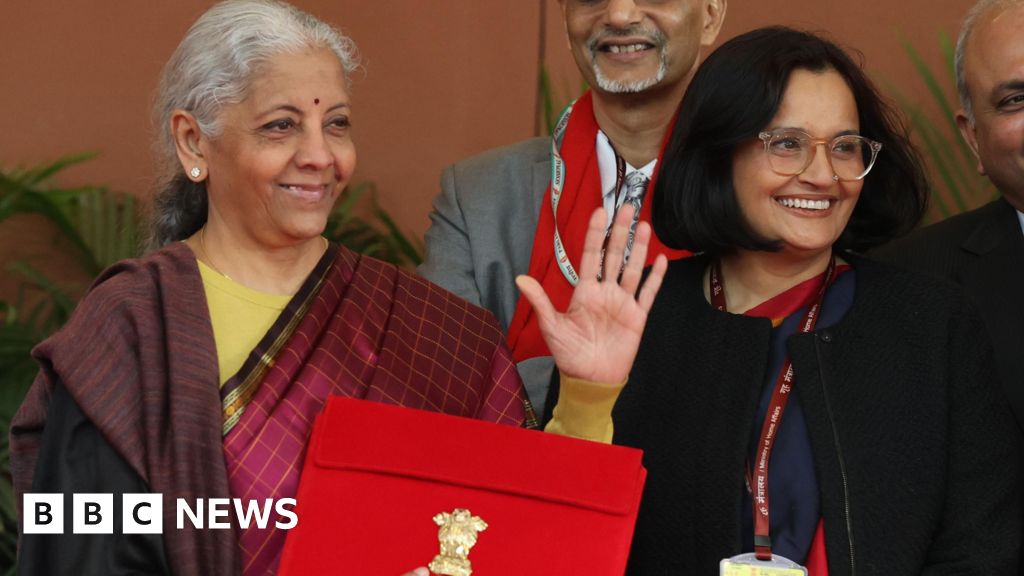Business
Badenoch ‘worried’ UK may need IMF bailout

Kemi Badenoch has said she is “really worried” that the UK might be forced to embark on a 1976-style bailout from the International Monetary Fund.
The Conservative leader told BBC Newsnight that the UK could be forced to go “cap in hand” to the IMF unless the government delivers a plan for economic growth.
She made her remarks as she offered to work with Sir Keir Starmer “in the national interest” to cut welfare spending. She said welfare cuts and growth were needed to help the government out of a “doom loop” of rising taxes and precarious public finances.
A Labour Party source said Mrs Badenoch had a “brass neck” for offering such advice, after the Conservative government had “crashed the economy”.
The Labour government of the late prime minister Jim Callaghan was forced to apply for a $3.9bn (£2.9bn) emergency loan from the IMF during the 1976 sterling crisis.
That was seen as a seminal event in post war economic history which severely undermined the economic credibility of the Callaghan government.
Asked what made her think the UK is heading towards the need for an IMF bailout, Badenoch said: “A lot of the indicators are pointing in that direction.
“Many very well respected commentators and economists are saying this.”
A number of economists, mainly on the right, have in recent weeks raised the prospect of a version of the 1976 sterling crisis repeating itself. Other economists have dismissed this as hyperbole.
Andrew Sentance, a former member of the Bank of England Monetary Policy, wrote of “eerie parallels” between the position of the current chancellor and that of the late Denis Healey, chancellor during the 1976 sterling crisis.
But in an article for the Sun last month, Mr Sentance concluded: “The UK may not end up calling in the IMF.”
Governments borrow money from investors by selling bonds – which is a loan the government promises to pay back at the end of an agreed time. The yield on 30-year UK government bonds – which are known as gilts – has been rising for a number of months, although has now fallen back slightly.
Badenoch said there was a “crisis” in UK bond prices.
She pointed to UK borrowing costs hitting a 27-year high last week as “yet another indicator” and stressed “we are not growing enough”.
The Tory leader said: “Labour does not have any plan for growth,” adding: “They thought that as soon as they got into power, things would just work because they’re Labour and they believe in their own righteousness.
“That is not working – they need to get a plan to grow our economy, otherwise we will end up going to the IMF cap in hand.”
Dismissing a suggestion she was talking the country down, she claimed that doing nothing “would be a dereliction of duty on my part” and said was instead offering “an olive branch” to the prime minister to work with him.
“If we do get that sort of crisis because of their bad decisions, we’re all going to suffer,” she said.
“There is no benefit for the opposition party in a country that’s doing badly.
“We want our country to do well and we will work with the national interest to get that.”
The Conservatives have two key demands for working with Sir Keir, which are maintaining the two child benefit cap and slashing welfare, although the Tories did not support the government when Sir Keir was forced to water down the welfare Bill by a backbench rebellion in July.
“I’m sure that we’ll be able to come up with some suggestions, and then if we agree to that – it’s not a blank cheque – but if we can find some agreements, then yes, we’ll support it,” she said of the Bill.
In response to Badenoch’s comments, the Labour Party source said: “Kemi Badenoch’s Conservatives crashed the economy and sent mortgages spiralling. The brass neck Kemi has to think she can offer advice on the economy now is astonishing. The Tories haven’t listened and they haven’t learned.”
Business
Budget 2026: India pushes local industry as global tensions rise

India’s budget focuses on infrastructure and defence spending and tax breaks for data-centre investments.
Source link
Business
New Income Tax Act 2025 to come into effect from April 1, key reliefs announced in Budget 2026

New Delhi: Finance Minister Nirmala Sitharaman on Sunday said that the Income Tax Act 2025 will come into effect from April 1, 2026, and the I-T forms have been redesigned such that ordinary citizens can comply without difficulty for ease of living.
The new measures include exemption on insurance interest awards, nil deduction certificates for small taxpayers, and extension of the ITR filing deadline for non-audit cases to August 31.
Individuals with ITR 1 and ITR 2 will continue to file I-T returns till July 31.
“In July 2024, I announced a comprehensive review of the Income Tax Act 1961. This was completed in record time, and the Income Tax Act 2025 will come into effect from April 1, 2026. The forms have been redesigned such that ordinary citizens can comply without difficulty, for) ease of living,” she said while presenting the Budget 2026-27
In a move that directly eases cash-flow pressure on individuals making overseas payments, the Union Budget announced lower tax collection at source across key categories.
“I propose to reduce the TCS rate on the sale of overseas tour programme packages from the current 5 per cent and 20 per cent to 2 per cent without any stipulation of amount. I propose to reduce the TCS rate for pursuing education and for medical purposes from 5 per cent to 2 per cent,” said Sitharaman.
She clarified withholding on services, adding that “supply of manpower services is proposed to be specifically brought within the ambit of payment contractors for the purpose of TDS to avoid ambiguity”.
“Thus, TDS on these services will be at the rate of either 1 per cent or 2 per cent only,” she mentioned during her Budget speech.
The Budget also proposes a tax holiday for foreign cloud companies using data centres in India till 2047.
Business
Budget 2026 Live Updates: TCS On Overseas Tour Packages Slashed To 2%; TDS On Education LRS Eased

Union Budget 2026 Live Updates: Union Budget 2026 Live Updates: Finance Minister Nirmala Sitharaman is presenting the Union Budget 2026-27 in Parliament, her record ninth budget speech. During her Budget Speech, the FM will detail budgetary allocations and revenue projections for the upcoming financial year 2026-27. Sitharaman is notably dressed in a Kanjeevaram Silk saree, a nod to the traditional weaving sector in poll-bound Tamil Nadu.
The budget comes at a time when there is geopolitical turmoil, economic volatility and trade war. Different sectors are looking to get some support with new measures and relaxations ahead of the budget, especially export-oriented industries, which have borne the brunt of the higher US tariffs being imposed last year by the Trump administration.
On January 29, 2026, Sitharaman tabled the Economic Survey 2025-26, a comprehensive snapshot of the country’s macro-economic situation, in Parliament, setting the stage for the budget and showing the government’s roadmap. The survey projected that India’s economy is expected to grow 6.8%-7.2% in FY27, underscoring resilience even as global economic uncertainty persists.
Budget 2026 Expectations
Expectations across key sectors are taking shape as stakeholders look to the Budget for support that sustains growth, strengthens jobs and eases financial pressures:
Taxpayers & Households: Many taxpayers want practical improvements to the income tax structure that preserve simplicity while supporting long-term financial planning — including broader deductions for home loan interest and diversified retirement savings options.
New Tax Regime vs Old Tax Regime | New Income Tax Rules | Income Tax 2026
Businesses & Industry: With industrial output and investment showing resilience, firms are looking for policies that bolster capital formation, ease compliance, and expand infrastructure spending — especially in manufacturing and technology-driven sectors that promise jobs and exports.
Startups & Innovation: The startup ecosystem expects incentives around employee stock options and capital access, along with regulatory tweaks that encourage risk capital and talent retention without increasing compliance burdens.
Also See: Stock Market Updates Today
The Budget speech will be broadcast live here and on all other news channels. You can also catch all the updates about Budget 2026 on News18.com. News18 will provide detailed live blog updates on the Budget speech, and political, industry, and market reactions.
We are providing a full, detailed coverage of the union budget 2026 here, with a lot of insights, experts’ views and analyses. Stay tuned with us to get latest updates.
Also Read: Budget 2026 Live Streaming
Here are the Live Updates of Union Budget 2026:
-

 Fashion1 week ago
Fashion1 week agoSouth Korea tilts sourcing towards China as apparel imports shift
-

 Sports5 days ago
Sports5 days agoPSL 11: Local players’ category renewals unveiled ahead of auction
-

 Sports1 week ago
Sports1 week agoWanted Olympian-turned-fugitive Ryan Wedding in custody, sources say
-

 Tech1 week ago
Tech1 week agoStrap One of Our Favorite Action Cameras to Your Helmet or a Floaty
-

 Entertainment1 week ago
Entertainment1 week agoThree dead after suicide blast targets peace committee leader’s home in DI Khan
-

 Tech1 week ago
Tech1 week agoThis Mega Snowstorm Will Be a Test for the US Supply Chain
-

 Sports1 week ago
Sports1 week agoStorylines shaping the 2025-26 men’s college basketball season
-

 Fashion1 week ago
Fashion1 week agoSpain’s apparel imports up 7.10% in Jan-Oct as sourcing realigns





